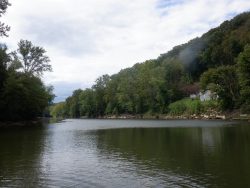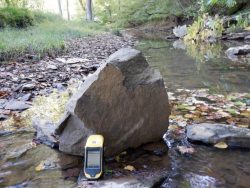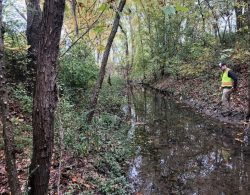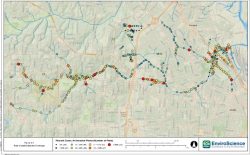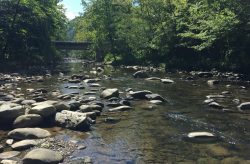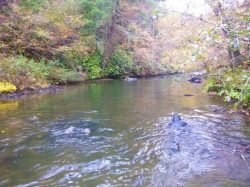BIG SANDY CRAYFISH SURVEY FOR PROPOSED BRIDGE REPLACEMENT
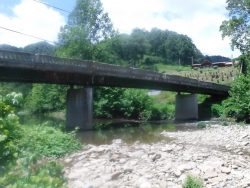 (McDowell County, WV) In an effort to allow safe travel over Dry Fork for residents of McDowell County, the West Virginia Division of Highways (WVDOH) and Federal Highway Administration proposed the demolition of a one-lane, three-span bridge built in 1941 and the construction of a new two-lane, two-span steel bridge. The proposed project location at Dry Fork has been designated a critical habitat for the federally threatened Big Sandy crayfish (Cambarus callainus). Due to the proposed instream work associated with the project, the United States Fish and Wildlife Service (USFWS) and West Virginia Division of Natural Resources (WVDNR) enlisted the help of EnviroScience, Inc. to perform a required benthic macroinvertebrate survey.
(McDowell County, WV) In an effort to allow safe travel over Dry Fork for residents of McDowell County, the West Virginia Division of Highways (WVDOH) and Federal Highway Administration proposed the demolition of a one-lane, three-span bridge built in 1941 and the construction of a new two-lane, two-span steel bridge. The proposed project location at Dry Fork has been designated a critical habitat for the federally threatened Big Sandy crayfish (Cambarus callainus). Due to the proposed instream work associated with the project, the United States Fish and Wildlife Service (USFWS) and West Virginia Division of Natural Resources (WVDNR) enlisted the help of EnviroScience, Inc. to perform a required benthic macroinvertebrate survey.
EnviroScience’s agency approved surveyors developed and carried out a survey plan at the project location. A total of three federally threatened Big Sandy crayfish were collected during the effort. Using a sub-meter accurate GPS, the location of each crayfish was logged, and coordinates were provided to WVDNR and USFWS.
Having confirmed the presence of Big Sandy crayfish at the proposed project location, EnviroScience reported its findings to USFWS and recommended measures be taken to ensure protection of the federally threatened crayfish and preservation of its habitat. To minimize potential ecological impact, WVDOH and project engineers implemented species-specific conservation measures with particular focus on bridge design, project sequence and timing, best management practices (BMP), and construction methods.
